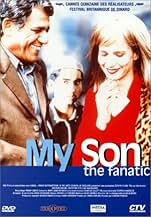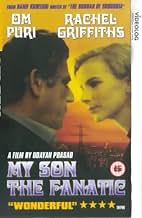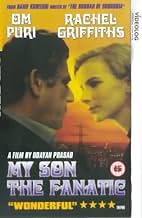अपनी भाषा में प्लॉट जोड़ेंPakistani taxi-driver Parvez and prostitute Bettina find themselves trapped in the middle when Islamic fundamentalists decide to clean up their local town.Pakistani taxi-driver Parvez and prostitute Bettina find themselves trapped in the middle when Islamic fundamentalists decide to clean up their local town.Pakistani taxi-driver Parvez and prostitute Bettina find themselves trapped in the middle when Islamic fundamentalists decide to clean up their local town.
- पुरस्कार
- 1 जीत और कुल 6 नामांकन
- Madeline Fingerhut
- (as Sarah Jane Potts)
- Rashid
- (as Omar Salimi)
फ़ीचर्ड समीक्षाएं
It starts off making you think that this is going to be a comedy about a social-ladder-climbing father undermined by his son's discovery and subsequent rapture of Islamic fundamentalism. When re-viewing the consistency of the tones and hues, it seems that most scenes are being seen through the main character's (Parvez) eyes. And he turns out to be the most unreliable of narrators -- a literary device difficult to translate into film. In most of the darker and smoky hues, Parvez seems to be a warm, loving, tolerant, supportive, and protective soul.
In the lighter-toned scenes, we learn that Parvez is actually is clueless to who he is and how he is perceived. The fact is that he is a pathetic failure as a husband, father, and "career" man -- a 25-year taxi driver in a poor town in England (Does anyone know what city/town this is supposed to be? It was unclear to me.) where the cab drivers serve as a conduit between prostitutes and their clients. Throughout the movie, he sinks further into the throes of an alcoholic depression. He is an affable and engaging drunk, but a drunk nonetheless.
His son's rejection of his depressed and drunken father manifests itself in turning to Islamic Fundamentalism. His wife tries to awaken him as to what is going on, but to no avail. Pervez's sodden eyes sees life only in his own terms. Pervez sees the holy man as a fraud, and thus invents a scene in his mind that everyone else denies, played in near-total darkness, where the holy man asks him for immigration help from his (actually non-existent) political connections with the Fingerhuts, who despise him.
Someone else correctly pointed out that the son's adulation of Ayatollah Khomeni is inconsistent with the Pakistani fundamentalist sects that populate Karachi. This is the one well-lit scene where falsehood prevails, but I think that was just a fact-checking error.
As he sinks deeper, Pervez conjures up a loving relationship with his favorite whore, the reality of which is depicted in the final scenes as the credits roll.
The movie was never really about his son at all. His life was never really about the love he invested in his family at all. It is about a disintegration of a once-noble soul due to depression and alcoholism, and how the world looks through his forgiving eyes.
This is a fascinating study in duality, but you need to watch it twice to see it that way. Bravura performances by Puri, the actress who played the wife, and Griffiths as the multi-wigged prostitute are a joy to behold. There are slow and murky patches, but worth sticking with as a fascinating exploration into the culture clashes and reality blurring characteristic of alcoholic depression -- a disease with an acutely higher incidence in the UK among Asian immigrants.
Well worth watching.
The writer Hanif Kureishi's onetime Benetton smugness has mellowed into ripe colors of rue, mockery and regret as he eases into middle age, and this adaptation of his short story is a lovely, surprisingly beautifully shot, sneakily haunting small movie. The dialogue sometimes has a novelish explicitness, and the performances are variable--Puri sometimes drifts into F. Murray Abraham terrain, but he has an amazing, craggy, pain-absorbent face. But the movie has a real subject: the ways in which postmod culture-hybridity isn't always a rainbow-colored day at the beach. And the warmth amid desperation of the central relationship suggests what Neil Jordan's MONA LISA might have been without the smoky-sax romanticism.
The sad thing about seeing this movie was that, after Miramax gave the movie one of their unceremonious heave-hos (par for the course for their good movies), the audience, unblanketed by buzz, hype, an aura of hot-ticket, reacted as shruggingly as critics seem to have. Too bad: MY SON THE FANATIC evokes the sweet, melancholy fatalism of seventies pictures like THE NICKEL RIDE and STRAIGHT TIME. It has the atmosphere of an overcast crime picture without the crime. And it has at least a handful of real, breathing people in it--as rare an occurrence these days as a flight of the dodo.
Om Puri's character is not to be forgotten and Griffith gives the searingly intelligent performance I have come to expect of her. Kurtha, as the son, is very poor, his delivery stilted and amateurish, and an outdoorsy scene with the two lovers is cinematographically squandered; otherwise, nothing but raves for this one. Also takes the prize for sexiest and most heartbreaking love scene in movie history.
क्या आपको पता है
- भाव
[first lines]
Mrs. Fingerhut: [putting away photo album] Madeline was a delightful girl. She still is, of course.
Parvez: And a little bit plumpish at times. As you said, twice.
Minoo: [misunderstanding] Rice is very good. For reducing diet.
Parvez: Cricket is excellent. Farid was captain. Mrs. Fingerhut - Hilda - this boy of ours, I can assure you he's all-around type, going whole hog. But not on the field. At school he carried the prizes home. Now is college he's top student of year.
Parvez: Oh, it's not difficult.
Farid: [smirks]
टॉप पसंद
- How long is My Son the Fanatic?Alexa द्वारा संचालित
विवरण
बॉक्स ऑफ़िस
- US और कनाडा में सकल
- $4,17,683
- US और कनाडा में पहले सप्ताह में कुल कमाई
- $38,399
- 27 जून 1999
- दुनिया भर में सकल
- $4,17,683
- चलने की अवधि1 घंटा 27 मिनट
- ध्वनि मिश्रण
- पक्ष अनुपात
- 1.85 : 1
इस पेज में योगदान दें


































